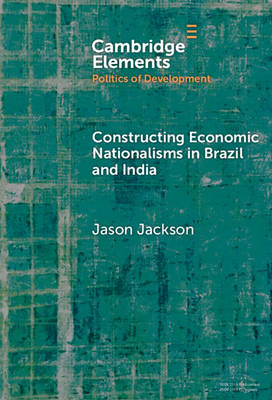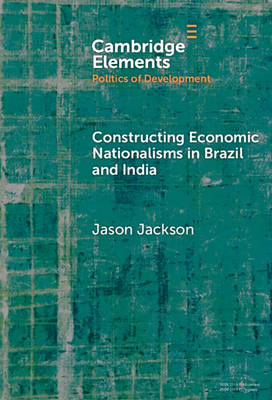
- Afhalen na 1 uur in een winkel met voorraad
- Gratis thuislevering in België vanaf € 30
- Ruim aanbod met 7 miljoen producten
- Afhalen na 1 uur in een winkel met voorraad
- Gratis thuislevering in België vanaf € 30
- Ruim aanbod met 7 miljoen producten
Zoeken
Constructing Economic Nationalisms in Brazil and India
Jason Jackson
€ 112,95
+ 225 punten
Uitvoering
Omschrijving
While the concept of economic nationalism is frequently deployed it is often poorly defined, posited as the cause of protectionism in some cases while providing a rationale for liberalization in others. This Element provides a more rigorous articulation by analyzing variation in foreign investment regulation in postwar Brazil and India. Conventional approaches cite India's leftist "socialism" and Brazil's right-wing authoritarianism to explain why India resisted foreign direct investment (FDI) while Brazil welcomed foreign firms. However, this ignores puzzling industry-level variation: India restricted FDI in auto manufacturing but allowed multinationals in oil, while Brazil welcomed foreign auto companies but prohibited FDI in oil. This variation is inadequately explained by pluralist theories, structural-material approaches, or constructivist ideas. This Element argues that FDI policies were shaped by contrasting colonial experiences that generated distinct economic nationalisms and patterns of industrialization in both countries. This title is also available as Open Access on Cambridge Core.
Specificaties
Betrokkenen
- Auteur(s):
- Uitgeverij:
Inhoud
- Aantal bladzijden:
- 104
- Taal:
- Engels
- Reeks:
Eigenschappen
- Productcode (EAN):
- 9781009598576
- Verschijningsdatum:
- 22/01/2026
- Uitvoering:
- Hardcover
- Formaat:
- Genaaid
- Afmetingen:
- 152 mm x 229 mm
- Gewicht:
- 312 g

Alleen bij Standaard Boekhandel
+ 225 punten op je klantenkaart van Standaard Boekhandel
Beoordelingen
We publiceren alleen reviews die voldoen aan de voorwaarden voor reviews. Bekijk onze voorwaarden voor reviews.








